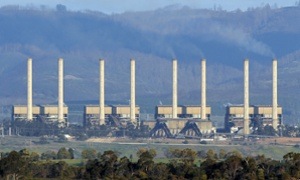
The Australian government has been urged to place US-style regulations on coal-fired power plants to ensure they shut down, as a new analysis highlights the vast scale of emissions pumped out by the largest carbon dioxide polluters in the country.
Just 10 companies are responsible for a third of Australia’s total greenhouse gas emissions, according to the Australian Conservation Foundation (ACF) study.
“We have got to close down the worst polluting plants in Australia,” said Geoff Cousins, ACF’s president. “At the moment the government is offering no incentives for companies to get off fossil fuels.”
Cousins said he would welcome the kind of direct regulations placed by Barack Obama’s US administration on coal-fired plants, effectively making them untenable without expensive carbon capture technology.
“In Australia there are taxpayer subsidies to keep these plants open, whereas in the US, China and parts of Europe, the government is taking actual direct action to close them down,” Cousins said.
When direct and indirect emissions, such as energy consumption by a coal power station, are considered, the top 10 polluters emitted 158m tonnes of greenhouse gases in 2013-14. Most of this pollution comes from the production and use of energy.
The list is headed by Energy Australia, responsible for 20.8m tonnes of heat-trapping gas. Macquarie Generation, at 20.3m tonnes, and AGL Energy, at 19.9m tonnes, are in second and third position.
The rest of the top 10 comprises energy and mining giants, including Rio Tinto, Origin Energy and Alcoa.
EnergyAustralia and Origin Energy chalked up the largest rises in emissions from 2012-13 to 2013-14, at 66% and 230% respectively. This was due to the companies buying power stations previously owned by the New South Wales government.
A separate ranking of Australia’s most polluting power stations is dominated by ageing power stations burning carbon-intensive brown coal in Victoria’s La Trobe valley.
Hazelwood, owned by GDY Suez, emits 15.5m tonnes of greenhouse gases a year, followed in the rankings by Yallourn and Loy Yang B.
The ACF report also notes the political donations made by the large energy and mining companies. EnergyAustralia donated more than $45,000 to the Labor and Coalition parties, at both state and federal level, in 2013-14, while Rio Tinto gave $175,521 to the Cormack Foundation, which is linked to the Coalition.
Victoria has previously considered shutting down its most polluting power stations, only for the plan to be shelved.
The introduction of carbon pricing included a large hand-out to the brown coal polluters, while the federal Coalition’s new Direct Action plan, which provides voluntary grants to lower emissions, is aimed at “cleaning up” power plants rather than shutting them down.
The UN’s IPCC has said that fossil fuel energy without largely unproven carbon capture technology must be phased out by the end of the century if the world is to avoid highly dangerous climate change.
The ACF said Australia needed to start phasing out fossil fuels, pointing to Energy Supply Association of Australia data that shows wind and solar energy projects already earmarked could provide a quarter of Australia’s electricity demand by 2023-24
“These companies should not be paid to shut down,” Cousins said. “There should be compensation for redundancies and retraining, but to pay them to shut down is wrong.”
But a spokesman for Greg Hunt, the federal environment minister, said: “Labor ran a failed contract-for-closure program. By contrast, we have passed the emissions reduction fund which is about to hold its first auction.
“We are not about to abandon our legislated policy in favour of an utterly failed policy.”
Cousins said there was a “real disconnect” between large energy companies acknowledging the risks posed by climate change and their opposition to the renewable energy target, a measure to increase clean energy that the Coalition wants to pare back.
“I think it will be very possible to change the policies of the government on this matter,” Cousins said. “There has been a remarkable coming together of events – climate change got on the G20 agenda against the wishes of the government, there was that remarkable speech by Obama at the Queensland University and there was the China-US climate deal.
“I think this has led the population to realise that we are being left behind, that the government has pulled the wool over our eyes. And now we see fossil fuels and climate change are back in the top five areas of concern in voting intentions. It’s clear the government is completely out of kilter with the rest of the world.”
